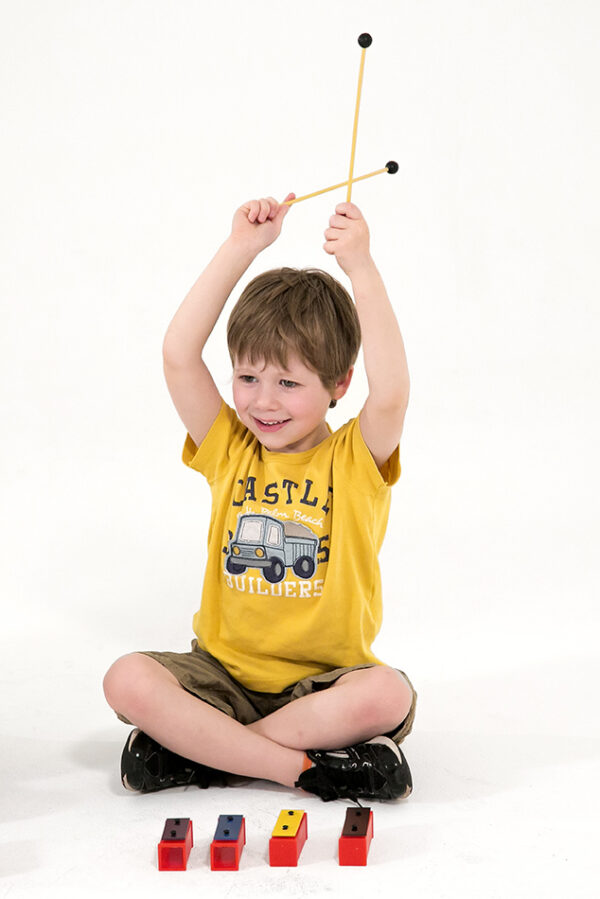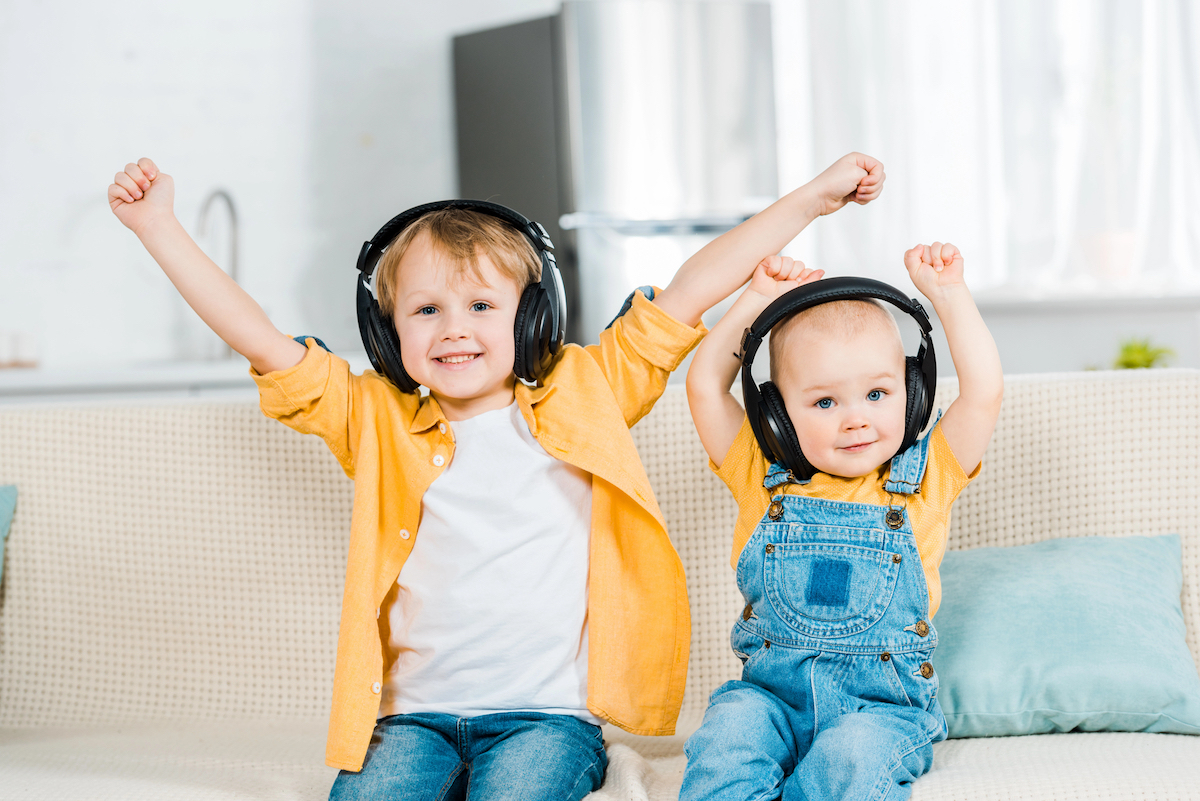Media kindly brought to you by Mini Maestros
We all know a song and a dance gives kids oodles of enjoyment, but did you know music also presents a huge developmental benefit for young children in particular? It’s common to assume that music is primarily limited to auditory stimulation of the brain, but it actually extends far beyond this, to form pathways between cells that are pivotal in expanding your little one’s full scope of cognitive function. In fact, listening to, playing, reading and creating music is the only activity that uses practically every part of the brain.
It’s never too early to encourage your child to find their musical mojo, and our friends at Mini Maestros have built their philosophy of ‘whole child’ development on the incredible power of music. They offer sequential and age-appropriate music lessons for children from 6 months all the way to 5 years of age. The Mini Maestros program has been refined by early childhood experts over 30 years to provide maximum support for a child’s developmental milestones.
Here, they share some fascinating facts about music’s beneficial impact on the growing human brain, and why parents should expose their child to as much of it as they possibly can!
Music touches (almost) every part of the brain
If you were to look at an MRI of a child (or adult) interacting with music, a bunch of different colours would represent how different areas of the brain are ‘lit up’ or active. That’s because music activates large-scale ‘neural networks’ that engage multiple areas of the brain simultaneously – and why it’s an excellent activity to stimulate kids’ brain power.
Furthermore, when we hear a song (which usually fuses lyrics and melody), it harnesses both the left and right hemispheres of the brain. Put simply, the left hemisphere (aka ‘analytical’ side of the brain) handles processing of lyrical/speech content, while the right hemisphere (aka ‘creative’ side of the brain) tackles the melody. Best of all, this happens as simultaneous, twin streams of information which is different from processing either speech or sound alone. And If your child is composing or contributing the song themselves, the effect is naturally amplified.
But what practical skills can children learn through music’s enhanced neural networks?
Moved by the music – physical and emotional development
If you’ve ever heard someone say they’ve been “moved by music”, this is a pretty accurate description of what’s happening in the brain, and the effect is two-fold.
Firstly, processing the pulse of music activates areas in the brain responsible for movement, and explains why music is inextricably linked to our insatiable head bopping and toe-tapping. Beyond listening, the act of playing music forms muscle memory – the repetition of a specific motor task until it becomes committed to memory. Making music engages the nerves associated with the muscle (notably, the hands, but also the eyes and vocal chords) sending signals to the brain that transforms reactions, and forges lifelong procedural memories of both gross and fine motor skills.
Secondly, when it comes to processing the rhythm and tonality of music, the limbic system of the brain responsible for memory and emotions, also lights up. Music stimulates all brain regions that are considered to be the core of emotional processing, and can trigger emotions such as excitement, happiness, nostalgia, and control others such as anxiety or fear. In this way, music is engaging your child’s physical movement and their emotional wellbeing.
But there’s so much more when it comes to children’s skill development through music!

Additional cognitive skills
We’ve seen that music helps kids move and feel, but there’s plenty more skill development that can impact their learning aptitude, academic performance and social cohesion.
- Language skills – Music and language are closely linked, and scientists concur that music and especially music training, enhances sensitivity to the sounds of speech, meaning that kids can learn to find patterns in speech, better memorise words, and increase reading comprehension – all through music.
- Social skills – Studies have shown that musical training targets a circuit of the brain that is responsible for perceiving emotion, meaning music can help kids understand what others are thinking and feeling, and to predict how they might behave – a demonstration of empathy which scientists refer to as “theory of mind”. Group music playing also teaches cooperation in order to synchronise with others and work in unison to achieve pleasing sounds.
- Mathematical skills – research has revealed an increase in mathematical comprehension when listening to music, due to the fact it increases activity in the areas of the brain that are used when applying reasoning to solve problems. In fact, Albert Einstein used to listen to music when he was trying to solve mathematical problems.

The earlier you start, the better
If you think you need to wait until your infant, toddler, or preschooler is older to appreciate music and experiment with musical instruments, think again! Although formal instruction on musical instruments tends to happen in school-aged children, parents should feel encouraged to plant the seed of music much earlier. In fact, the younger you start, the better the chance that musical talent and confidence will flourish, and it follows the same premise of why language learning and retention is easier for younger children.
The biological explanation for this relates to how humans are all born with more neurons than we actually need. Neural activity will peak under the age of 5, before our brain does a major dump of ‘unused’ neurons. Subsequently, children who learn music during their infancy and toddler years when neural activity is at its strongest, will build the muscle for music and their brain will become ‘designed’ to support the activity later in life. By filling your child’s life with music, you might even raise the next musical prodigy!

How to encourage music in your child’s life
“Structured music lessons significantly enhance children’s cognitive abilities — including language-based reasoning, short-term memory, planning and inhibition — which lead to improved academic performance.”
(Science Daily, 2018)
Creating the conditions for a musical life in the family home is an excellent first step in your child’s journey, but applying structure to harness musical education can be near impossible for the busy and/or musically untiatiated parent.
Enter Mini Maestros, which offers a structured program – and it is precisely this structure that creates a safe platform from which learning can occur through creative exploration. Here’s a snapshot of what it can achieve for your child:
- Aid their physical development through activities which encourage development of gross and fine motor skills and coordination and relaxation techniques.
- Enhance their emotional development through activities which help children develop an understanding of music being a combination of elements
- Allow them to experience group participation and thereby develop self-control, discipline and the skills of sharing and taking turns.
- Provide opportunities for the creative participation of each child by encouraging children to make musical decisions and contribute to simple and fun improvisation activities.
- Relate to their present cultural heritage and future experiences.
- Prepares your child for the classroom.
- Facilitates a space for social interaction.
- A highlight in your week, where you can spend special time with your little one and celebrate in their milestone achievements.
Visit the Mini Maestros website to learn more about the power of music and enrol your child in their highly successful program, which is sure to spark a lifetime of musical exploration and creativity.









